|
Saturday the weather
forecasts were all predicting showers. Due to the wet weather
we'd been having, it'd been a week since I had gotten out, so
I was tired of waiting for a sunny day and went out birding in
the afternoons anyway. I had good luck with the weather, and wasn't
rained on very much.
I headed up to Pitt
Meadows with three targets in mind: American Kestrel, Turkey Vulture,
and Townsend's Solitaire. All of them would be lifers. I was on
the Mary Hill Bypass, about halfway to the Pitt, when I saw something
large up in the sky. This was no bird, though; it was substantially
larger than that. It was an airship, and I pulled over to take
some photos of it.
|
|
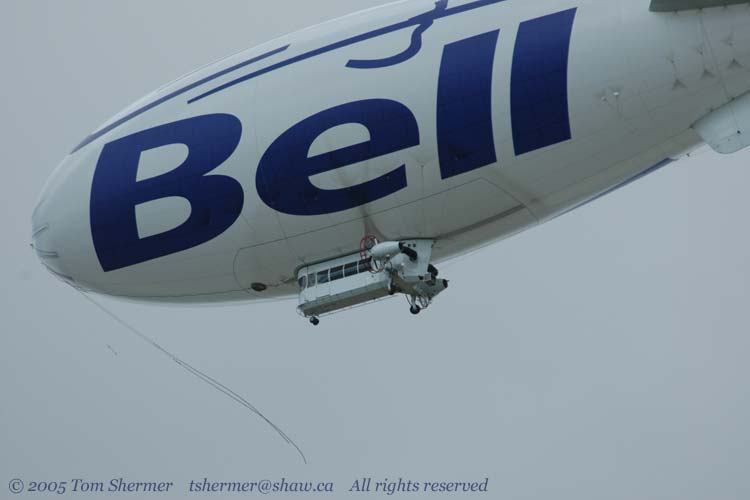 |
|
After a minute or so,
it had floated far enough away that it was very small in the frame,
so I headed back towards Pitt Meadows. A fellow named Roger had
reported that there was a kestrel that frequents Thompson Road,
so I decided to try there first.
The problem with that
was that none of my maps covers the north (i.e., interesting)
part of Pitt Meadows, and I wasn't familiar with Thompson Road.
So I was thinking that I'd have to drive around a bit to find
it. I headed over to Rannie Road by my usual route, which is along
McNeil. I was a little surprised to find that McNeil changes its
name to Thompson where it meets Rannie...or whatever Rannie is
called there. That was easy.
Finding the kestrel
was just as easy. I drove for about 20 seconds down Thompson,
and there on the wire beside the road is the bird. I pull over
onto the muddy shoulder, got out with my camera, and took a few
overexposed photos...I had metered my exposure on the bird, and
the sky was really bright compared to that. The kestrel took off,
and I got a couple of flight photos, but they were a little washed
out. Here's the best of them.
|
|
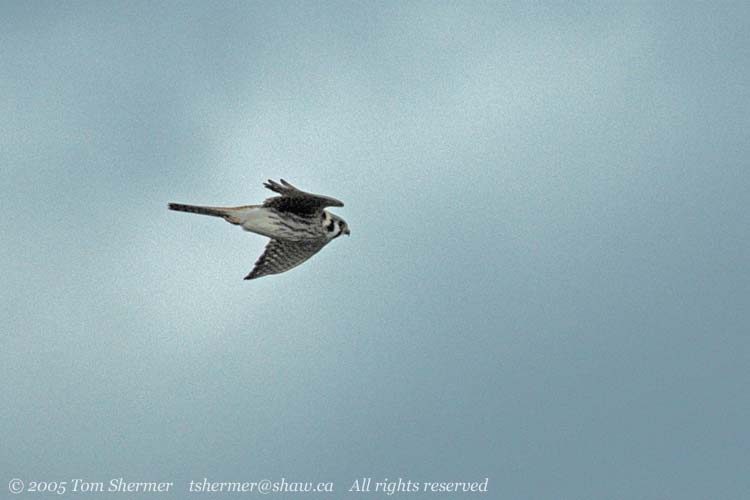 |
|
I'd never been on Thompson
before. At this part of the road, there is a tree farm on both
sides. The kestrel lit on one of the trees of the tree farm, north
of the road, right on the top of the tree. I got some more long-distance
shots, and as I was pulling my tripod out of my trunk, he took
off. I couldn't relocate him right away.
After about ten minutes,
though, I caught sight of him flying, now south of the road. He
flew behind the tree-farm building, and I walked to where I figure
he went, but again I couldn't find him. Another fifteen minutes
or so of waiting yielded no more kestrel sightings.
So I decided to head
farther down Thompson, to take photos of some sheep that I could
see in a field by the road. The poor adult beast here had some
sticks stuck in her wool.
|
|
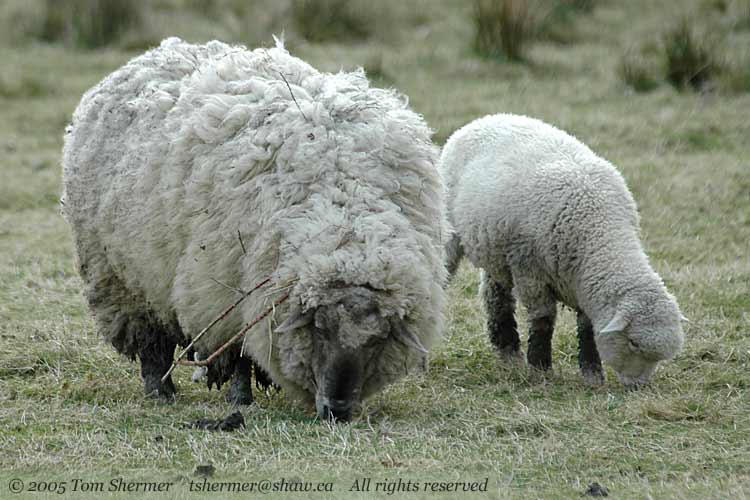 |
| This one
paused to look up and say hi. It sounded a little like "baaa,"
but I'm pretty sure she meant "hi". |
|
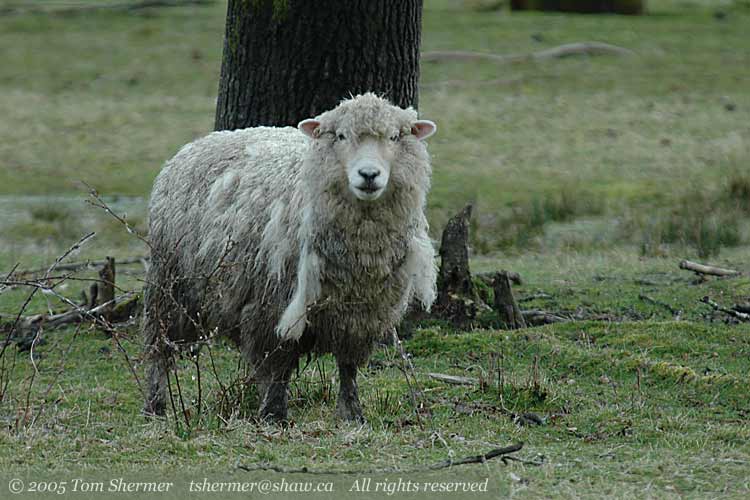 |
| I felt sorry
for this youngster. Such a little guy, but already one can tell
that he'll be forever known as the black sheep of his family. |
|
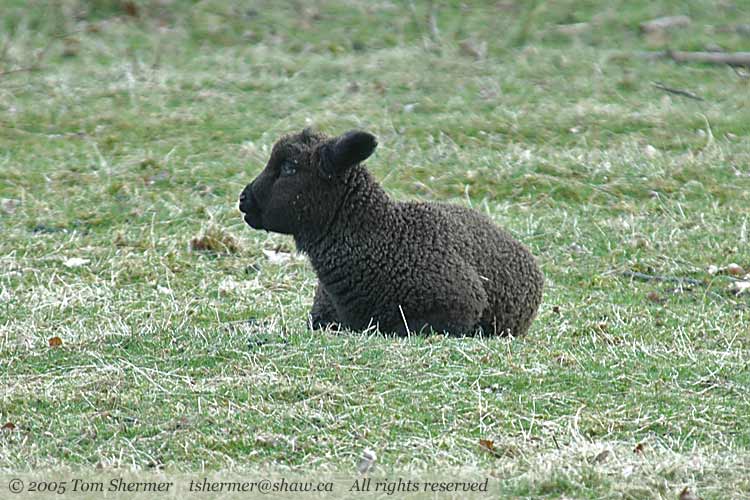 |
| Actually,
as I watched this tyke, a little slice of barnyard life played out
in front of me. He looked around, and then stood up and bleated
a couple of times in different directions. Apparently ( or is that
unparently?), he'd lost his mama. |
|
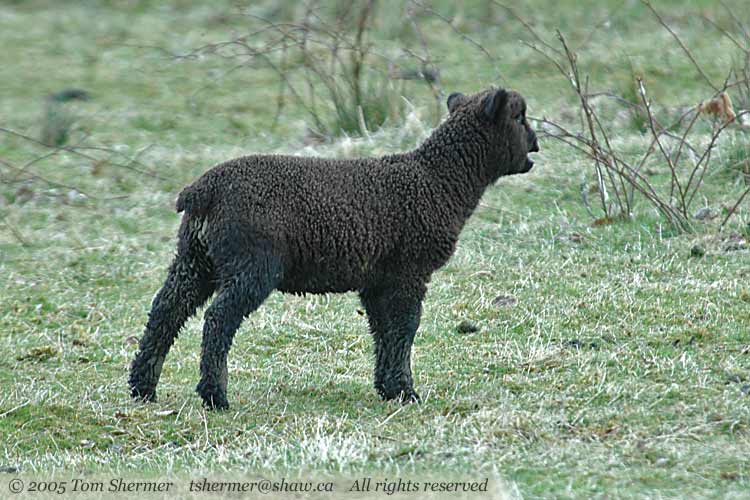 |
|
He paused, looking
around again. Then he started bleating loudly and insistently,
sounding more desperate and a little panicky.
After a short while,
I heard an adult towards the back of the field respond with about
four baaaas. Obviously the little guy heard as well, for
he went bounding off in the direction those baaaas came
from.
|
|
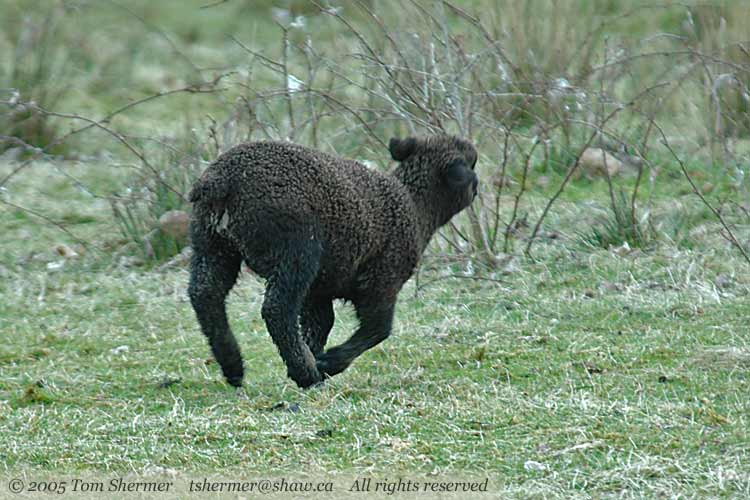 |
| A very relieved
little sheep then reunites with his ma in the back of the field.
|
|
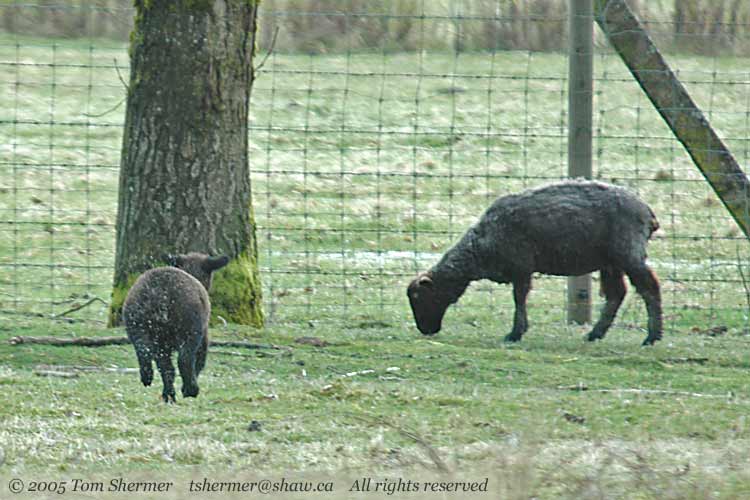 |
| The following
critter was about as tall as my bellybutton. Let this be a warning
to all you farmers out there: don't leave sheep and horses in the
same pen. You'll end up with these short, woolly horses...ain't
no good for shearing and ain't no good for riding, neither. |
|
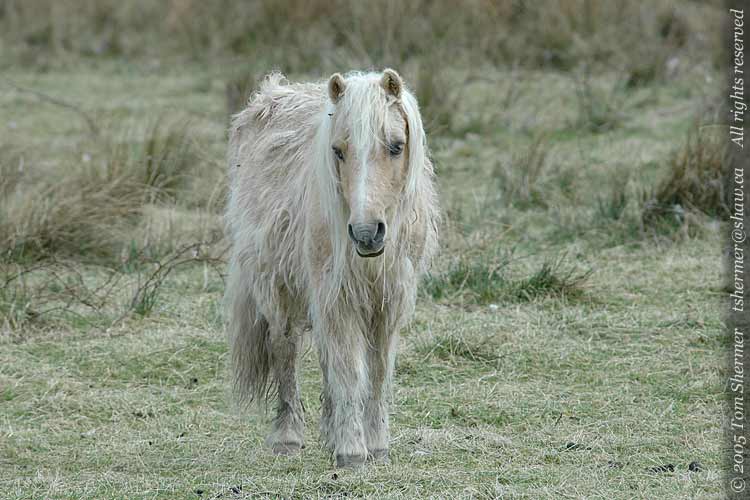 |
| At least
the chickens seemed relatively normal. |
|
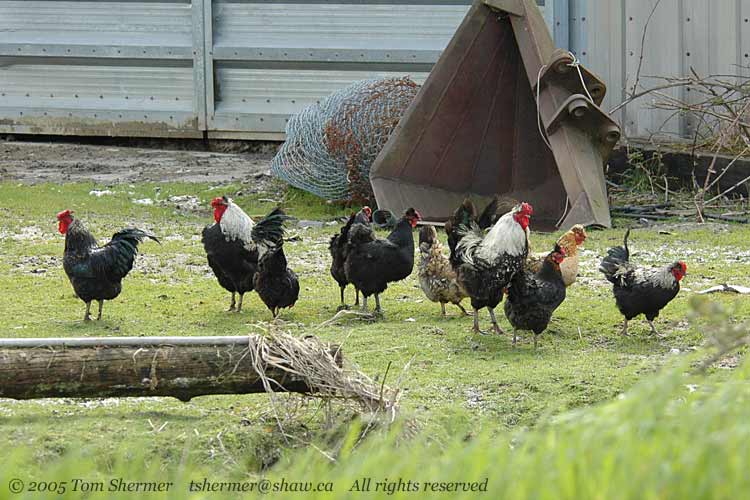 |
|
All the time I was
shooting at the farm, I kept my eye out for the kestrel, but it
didn't reappear. I finally decided to give up on the little bird
and head up towards Grant Narrows. As soon as I got Rannie Road
and started going north, though, some movement to my left catches
my eye. A bird had come up and matched speeds with my car...and
it was the kestrel. Mischievious little guy!
I pull over as he lands
on the wire and I finally get some decent photos of him. He is
one gorgeous little falcon.
|
|
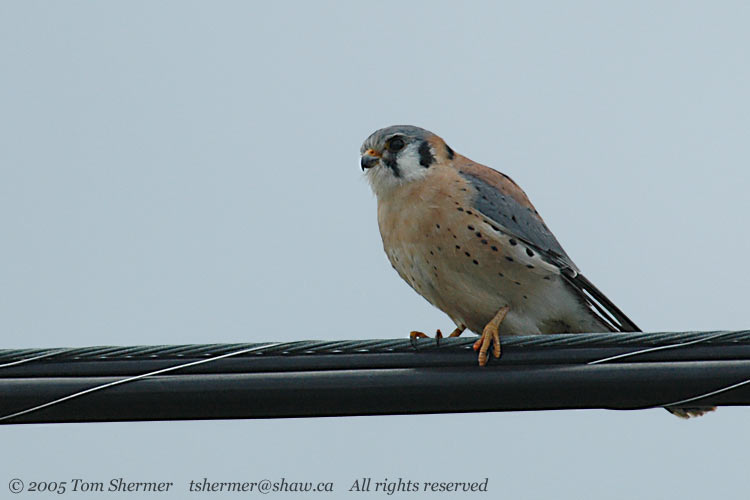 |
| |
|
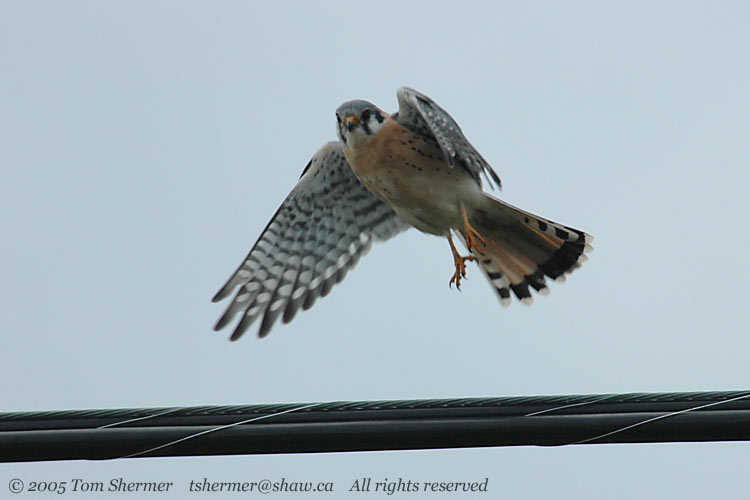 |
| Well, the
afternoon was off to a flying start. A little further north, I stopped
near a farm to look for vultures. Nothing doing on that score, but
the horses in the field next to where I was came over to see what
I was up to. Here's one of them. |
|
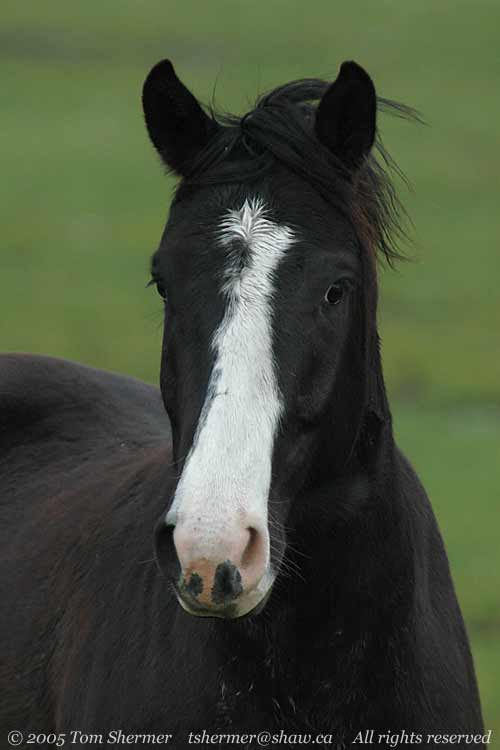 |
|
The other one was a
bit of an odd beast. He seemed quite desperate for company, for
someone to run with or play with. I told him to come closer, and
he came a little closer to me. That seemed pretty neat, so I told
him to go, and he moved a little further away.
At this point I was
wondering if this horse was really understanding me, and if so,
how much he understood. So on a lark I told him to roll over and
play dead.
|
|
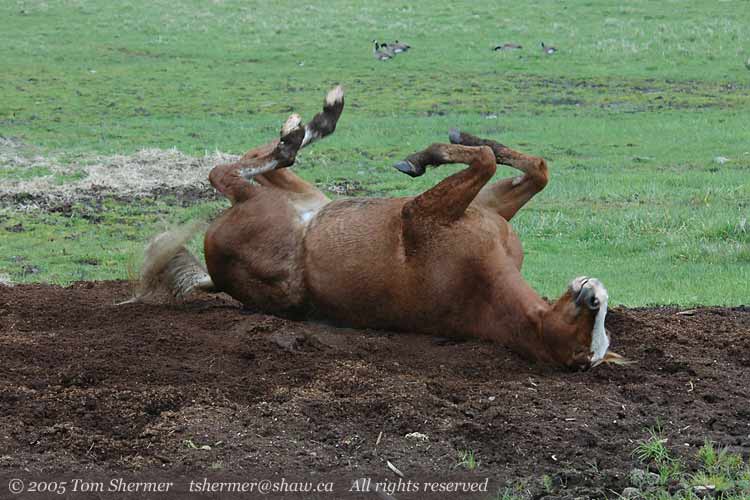 |
| Somebody
really ought to tell that animal that it's a horse. And yes, those
are Canada Geese in the background. There was also a Kildeer in
the field, hanging out pretty near the horses.
In the field behind
the horses, pretty far away, there were a couple of Sandhill Cranes.
Perhaps they were nesting out there; it was crane nesting season.
|
|
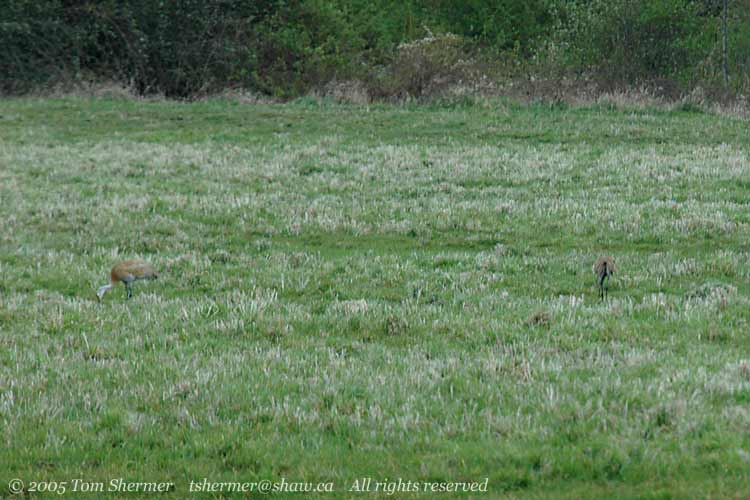 |
| I watched
the cranes for awhile, but they just seemed to be foraging.
That was all that was
going on at this stop, so I headed up the road a little farther
to a place where a couple of paths that I'd never explored lead
into the polder. I grabbed my camera and headed west. A Northern
Flicker flushed from beside the path and before I could photograph
it, it flushed again because of someone coming up the path towards
me.
The person passed and
I noticed some mushrooms growing out of a tree beside the path.
I found an angle on them with a good dark blue mountain in the
background.
|
|
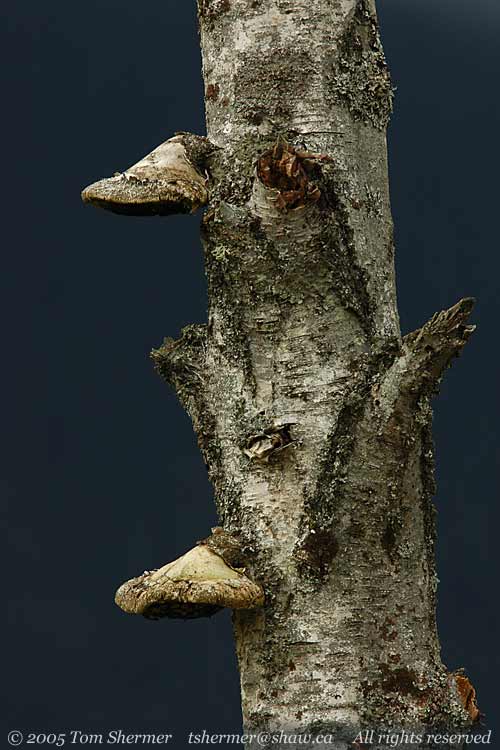 |
| Further
along the trail, to my right, in the marsh, I spotted a few Buffleheads
and Ring-necked Ducks. I couldn't get a good shot of the ducks,
but the marsh presented a nice view. |
|
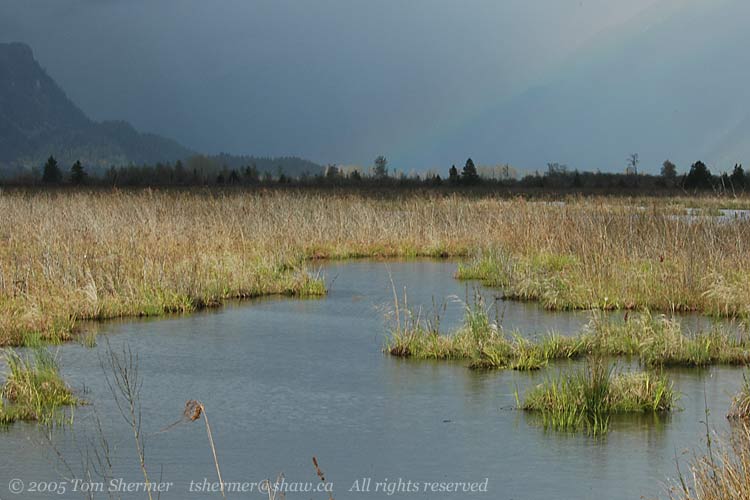 |
| I kept walking
as a small shower hit and then abated. Right then, a mink crossed
the path in front of me with a fish--a brown bullhead--in its mouth.
(Thanks to my pal Carlo for help with the identifications, but all
misidentifications are mine.) |
|
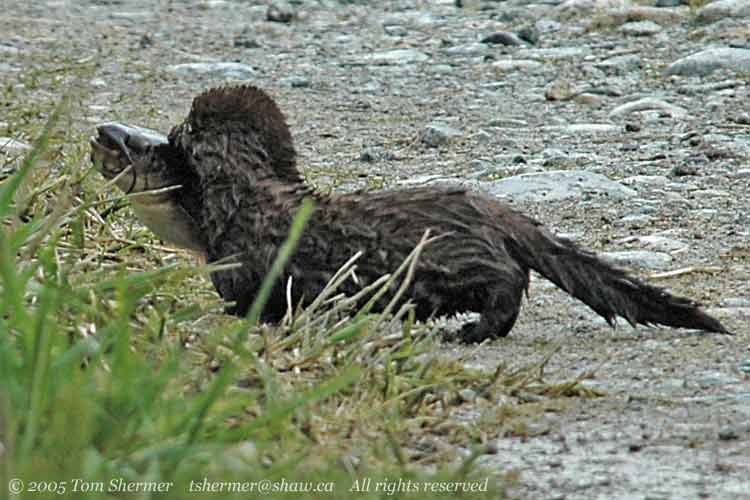 |
|
Well, he's a neat little
critter, but he really should clean his fur more often. It looks
all matted and muddy. As I was standing there wondering about
his grooming habits, he slipped into the water with his very ugly
catch of the day
|
|
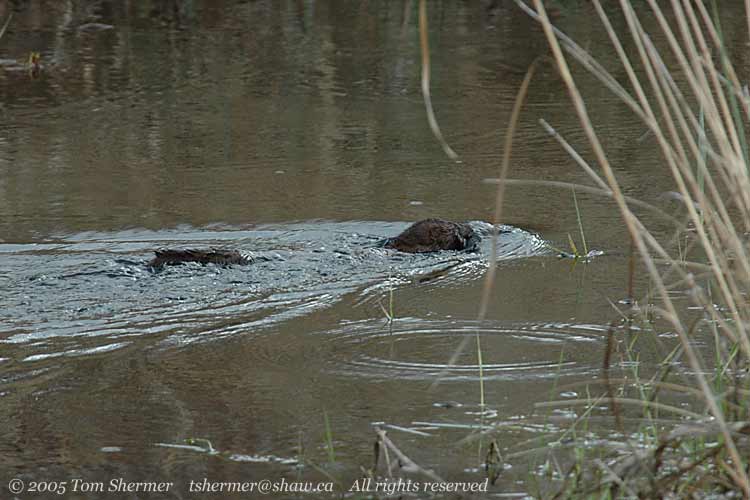 |
|
I mean it, too: neither
that mink nor his fish is going to win any beauty contests anytime
soon.
As the mink was paddling
off to his lair, the sun reappeared for a brief moment.
As that moment passed,
I gathered my wits, realizing that sun plus showers equals rainbow.
I turn around to look behind me, and sure enough, there's a rainbow.
The light is strong enough that it's a double.
|
|
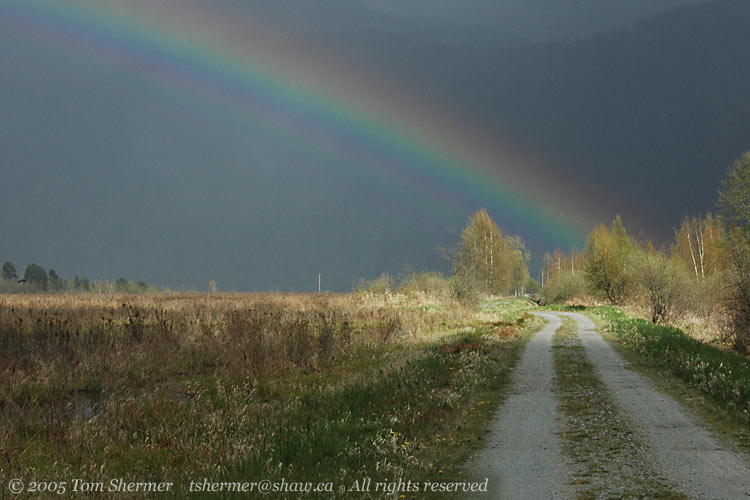 |
| I reached
the Pitt River dyke without seeing much of anything else except
crows. Once I was on the dyke, though, I heard a familiar call and
then I saw an Osprey at a nest out on a dolphin in the river. Here's
a pair of shots I got as he took off. |
|
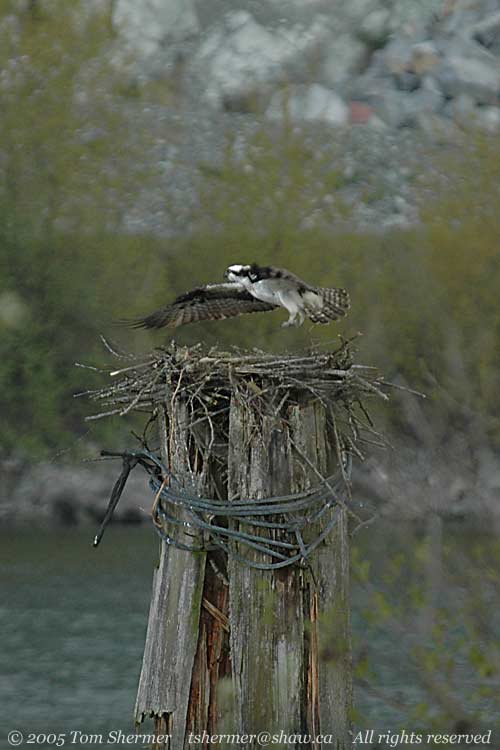 |
| |
|
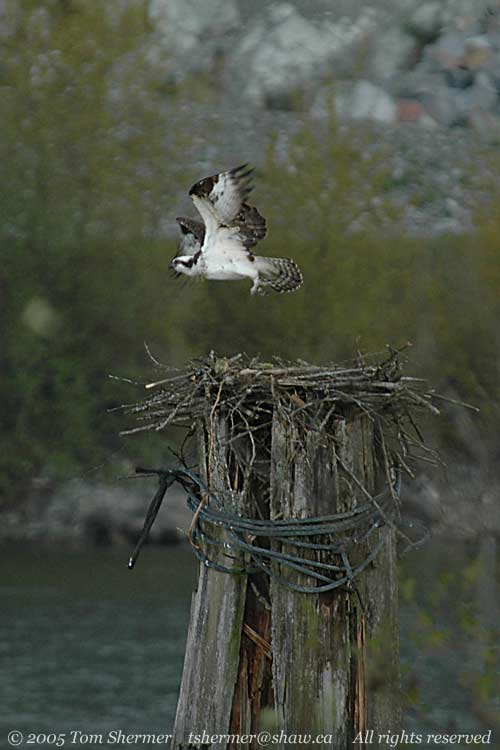 |
| Once airborne,
the osprey circled around the area, going almost directly over me
several times. Here are two shots of him on the wing. |
|
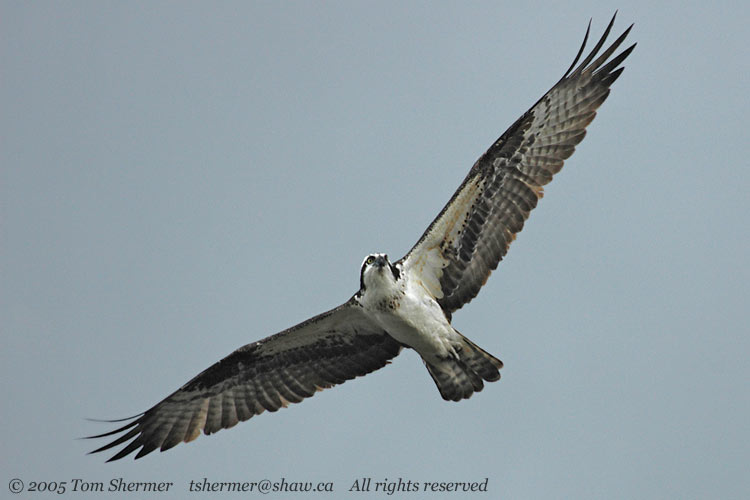 |
| |
|
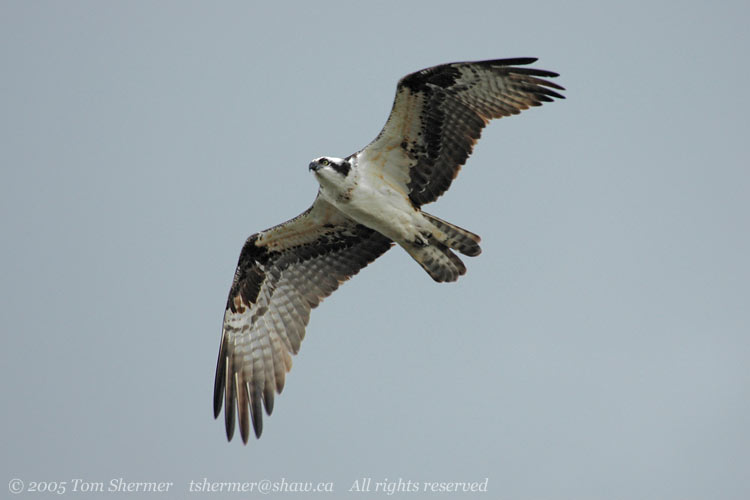 |
|
With the osprey flying
off, I headed back down the path towards my car. Soon I found
myself beside a swarm of warblers. They were Yellow-rumped Warblers,
and there seem to be about eight or nine of them.
There are two main
subspecies of Yellow-rumped Warblers, called Audubon's and Myrtle.
They differ in several respects, but the most obvious field mark
for telling them apart is the color of the chin patch, which is
yellow in Audubon's and white in Myrtle. The difference is most
dramatic in adult males.
Here's one of my swarm,
clearly an adult male Audubon's.
|
|
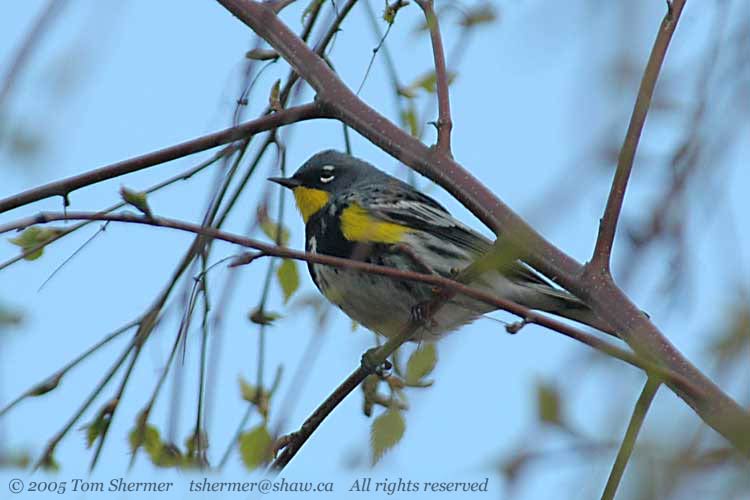 |
|
For comparison, here's
a handsome adult male Myrtle that I caught a little ways down
the trail.
|
|
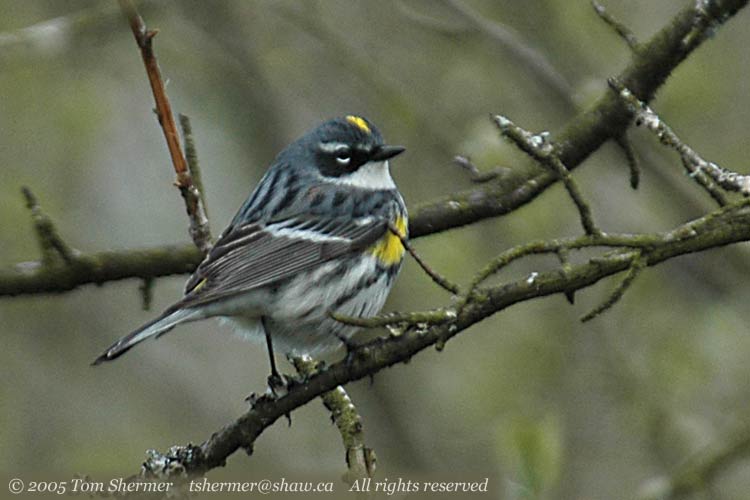 |
|
From that same group,
here's a first-winter (i.e. juvenile) Audubon's.
|
|
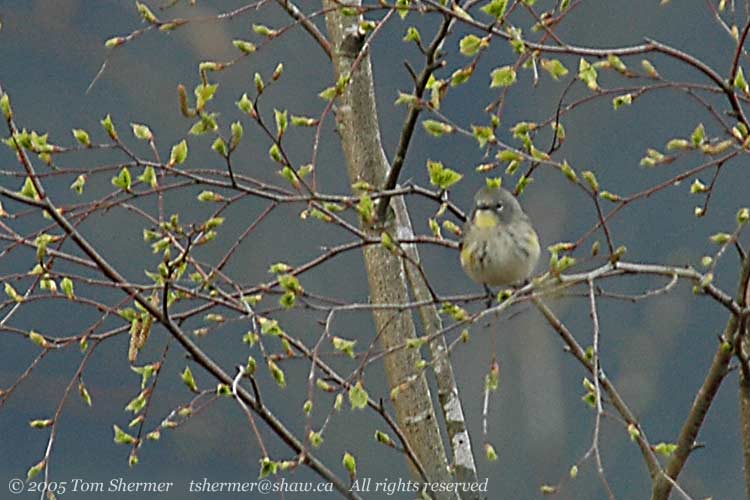 |
|
That bird must be ready
to molt, or already molting. April is about the latest that one
sees a Yellow-rumped in that plumage.
As I got back to the
end of the trail near the road, there were about three Ruby-crowned
Kinglets in the trees on the side of the path. I watched them
only long enough to verify that they were kinglets and not vireos.
Leaving the kinglets, I almost stepped on a slug making its way
across the trail.
|
|
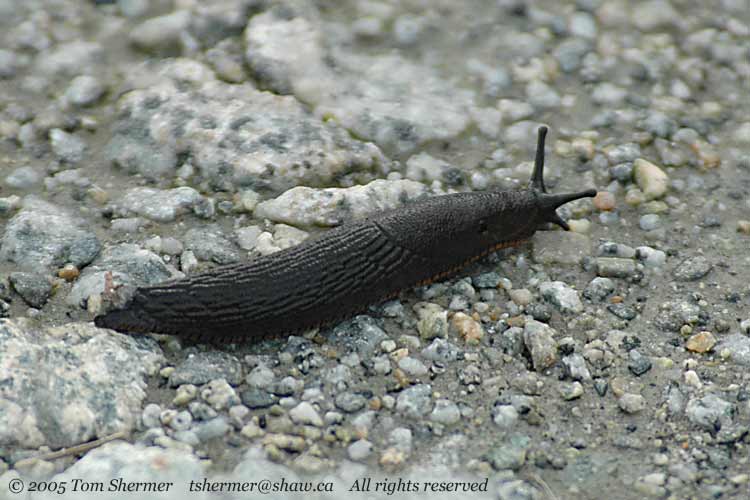 |
| It was now
about 5:30 and I got back in my car and headed up the road to Grant
Narrows. I'd missed on the vulture but still hoped to locate a Townsend's
Solitaiire. At the park, I went to the boat launch (where Roger
had reported the Solitaire) and was greeted by a trio of Northern
Flickers. Here's one of them, a female. |
|
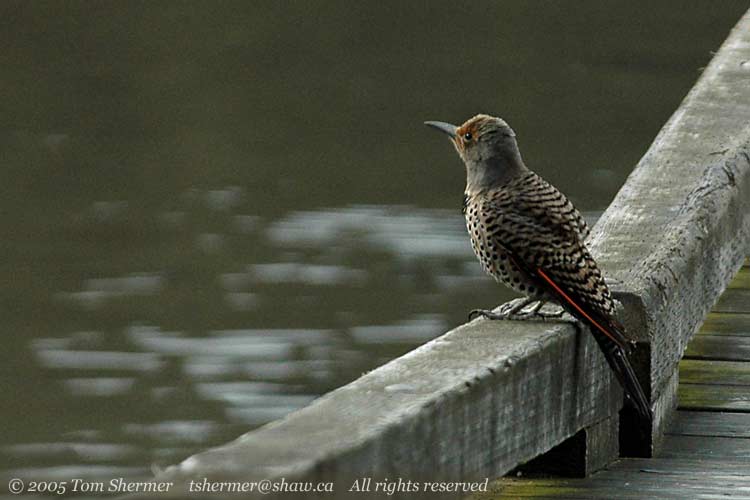 |
|
In the trees between
the canoe launch and the boat launch, there were a few more Ruby-crowned
Kinglets. They had their crowns showing and were chasing each
other around quite a bit. They were sometimes raising their crowns
all the way up, but sadly I wasn't able to get a photo of that.
Here's one of them, anyway.
|
|
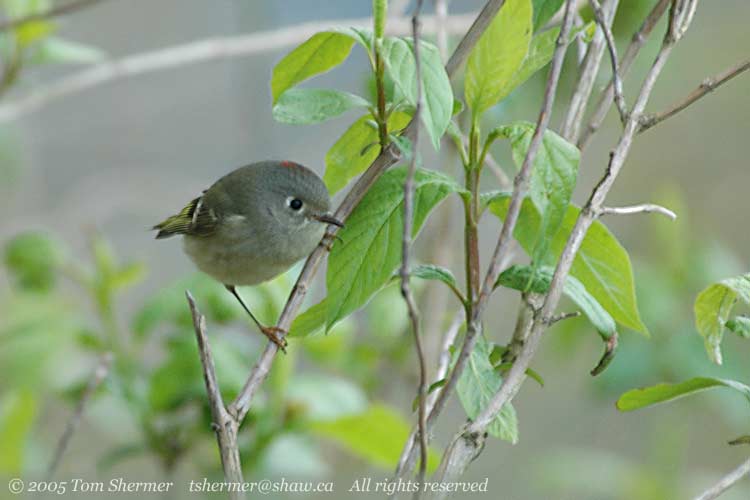 |
|
On the ground near
these trees were some fresh White-crowned Sparrows.
|
|
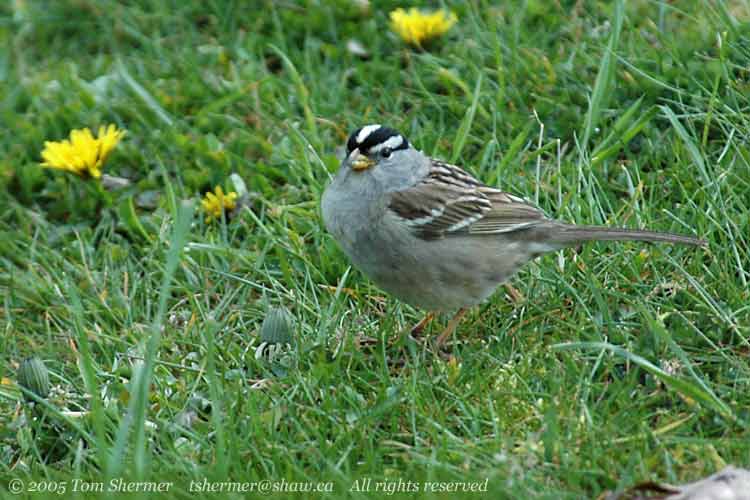 |
|
It's nice to see their
bold white and black stripes as they hop around.
I walked north to the
viewing platform, hoping to find the solitaire, but all I saw
were the ever-present Red-winged Blackbirds, and the local Osprey.
I turned back as it was getting dark, and a heavy shower broke
right before I got back to the gate. I hurried up and took shelter
at the snack bar across from the boat launch.
After the shower, I
went over to the boat launch one more time, and saw the flickers,
kinglets, and sparrows, but no solitaire. I happened to look down,
and found a Great Blue Heron right below me.
|
|
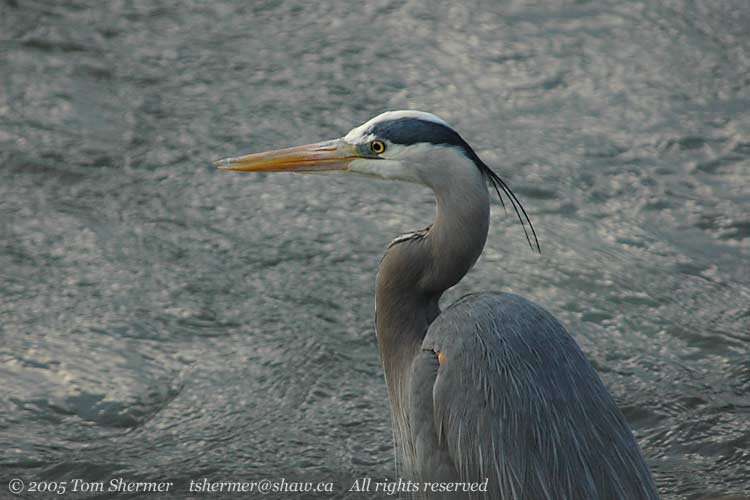 |
|
I'd had good luck with
Great Blues lately.
I took a few more photos
of flickers, as one of them foraged with the sparrows on the lawn.
Then I turned my attention to the canoe racks at the canoe rental
place.
|
|
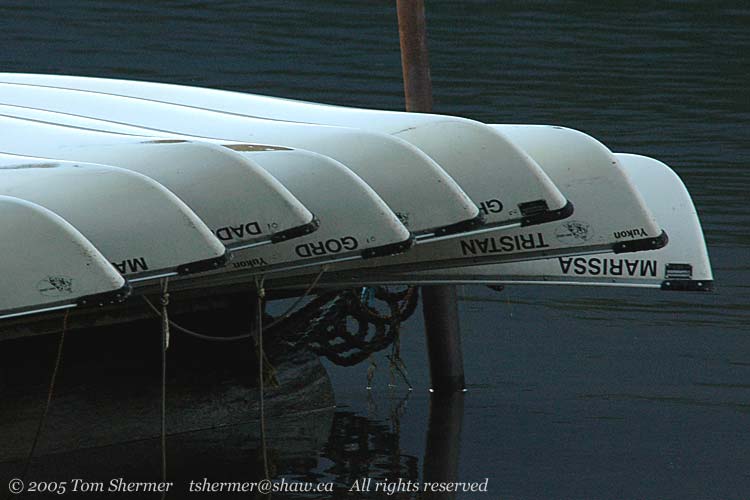 |
|
That was the end of
my day out, and even though I only got one of my targets, I was
quite happy about all the different things I saw.
Next time, I'll search
another location for a Townsend's Solitaire.
Wondering if the mink
was wondering about my grooming habits,
Tom
|
|